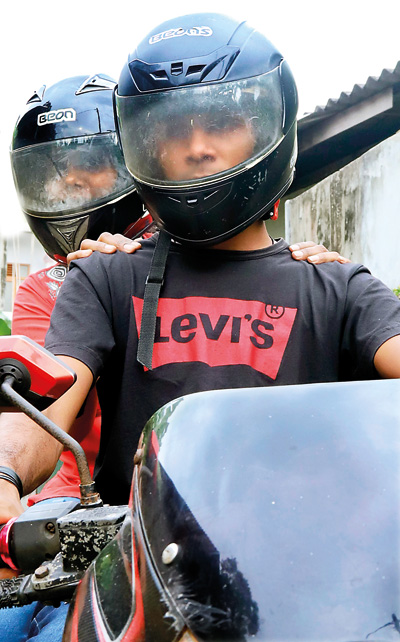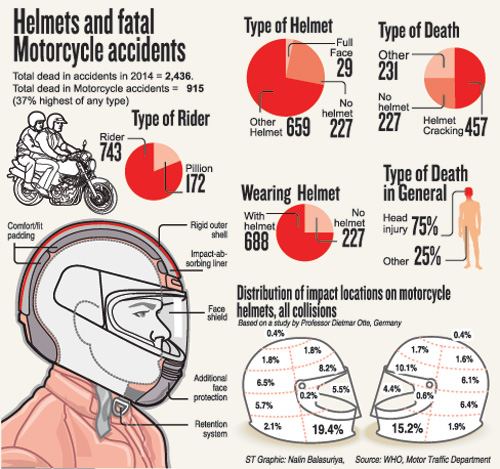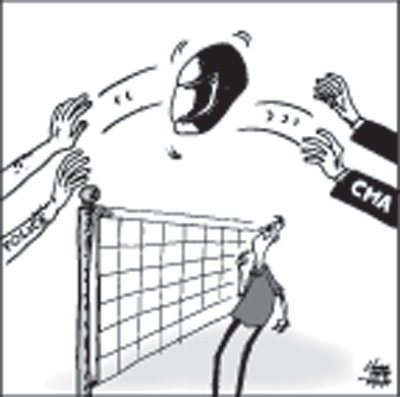News
Minimal facial injuries evidence backs use of full-face helmets
Full-face helmets offer far greater protection against facial injuries, research on road traffic accident victims show, while human rights experts argue that public interest should be balanced against protecting the lives of motorcyclists.

The number of people using full-face helmets declined following the police ban. Pic by Ishanka Sunimal
Full-face helmets were banned by police on a knee-jerk reaction to some crimes such as bank robberies, but the protection the helmets provide has been established as far superior to other types of helmets.
Ceylon Motorcyclists’ Association president, Chirantha Amerasinghe, told the Sunday Times that many motorcyclists end up being hurled forward and fall head first, which can be fatal.
“We can’t emphasise enough how important the full-face helmet is to a motorcycle rider. Safety must be taken into strict consideration due to the lack of viable protection,” he said.
Mr. Amerasighe said that the police, by approving the helmet with a visor (transparent shield) as an alternative, are exposing riders to worse dangers as the helmet is inherently designed to break off during an accident.
He said that the police, in banning the full-face helmets, have cited few criminal activities at which such head cover had been used.
“Banning full face-helmets to stop crime is an absurd argument, it’s like wanting to prohibit knives because murders are committed.’’
Mr. Amerasinghe also alleged that the gazette No. 2007/39, which includes the standards of helmets to be used, is flawed.
He added that in 2015 the Court of Appeal issued an interim order stating not to ban full-face helmets citing medical facts and safety of the motorcyclists. Moreover, a complaint filed in 2017 at the Human Rights Commission concluded wherein the government stated that amendments will be made to allow full-face helmets.
“A person wearing a full-face helmet can always be stopped and requested to reveal the identity. When lives are lost in accidents there is nobody to take responsibility for the deaths. or compensate families, which is a sad plight,” he said.
DIG (Traffic) Ajith Rohana told the Sunday Times that following the Easter Sunday attacks, amendments were made to the emergency regulations on the May 13, with regard to face coverings.
On advice from the Attorney General, he said that full face helmets were included in this category.
“Referring to gazette No. 2007/39 and the Attorney General’s advice was sufficient for us to take action and enforce the regulations to ban full-face helmets,” he said.
Asked about the alleged flaw in the gazette, he said that only courts can interpret the notice. “If the courts decide the gazette is null and void, only then will such a decision prevail.”
According to him, wearing a full-face helmet is a traffic offence for which a fine of Rs.3,500 is imposed, and following emergency regulations, the consequence is imprisonment.
“Under emergency laws, the ban is acceptable to reveal one’s identity. However, it rests in the medical sciences to prove such covers are necessary,” Human Rights Commission of Sri Lanka’s chairperson Dr. Deepika Udagama said.
Moreover, she emphasised that if there are crimes committed by those wearing full-face helmets the authorities ought to balance the interests of either party. “The state has an obligation to the public to do so because the protection of people is a vital factor.”
According to her, the debate is between the larger interest of the public versus the safety of the riders and if certain groups really need the full-face helmets to protect riders, that aspect must also be considered.
She said technical issues “must be resolved scientifically.’’
A research article in the Sri Lanka Dental Journal 2016 based on a study on the ‘pattern of maxillofacial trauma due to motorcycle accidents and the influence of helmets’, finds that the severity and number of facial fractures were remarkably low in full-face helmet users and therefore an open-face helmet should not be a substitute for a full-face helmet.
The authors, Dr. K.S. Jayasundara, registrar in oral and maxillofacial surgery, and consultant oral and maxillofacial surgeon, Dr. G. Navaratne of the Dental Institute of Colombo, centred the research on hospital based descriptive cross-sectional study done on 260 victims of motorcycle accidents referred to the Accidental Service of the National Hospital from January 1, 2016 to March 1, 2016.
The article identifies the significant attraction of the full-face helmet — that it protects the entire head and face. The outer shell protects the head and chin area and transparent shield (visor) protects the eyes and middle of the face.
But the number of people using full-face helmets declined following the police ban.
According to the researchers, out of the 260 patients, 90% were motorcycle riders and 10% were pillion riders. Among them 89% used helmets and 11% did not use helmets.
Moreover, among the riders who used helmets, 23% (or 60) wore full-face helmets, 46% (or 120) wore open-face helmets and 20% (or 52) wore helmets with visor (visor helmets).
The highest percentage of facial fractures were recorded as 57% who did not wear helmets. Those wearing open-face helmets had 49%, visor helmet users had 28.8% and full-face helmet users had the lowest percentage of facial fractures at 1.6%. Moreover all upper, middle and lower facial trauma were remarkably low in full-face helmet users.
“Standards for helmets are introduced for the safety of the motorcycle rider, but there will always be people who will disregard our efforts,” the Deputy Minister of Transport and Civil Aviation, Ashok Abeysinghe, said.
When asked about the flawed gazette notice, he said there is no such thing and that laws are enacted to protect lives.

